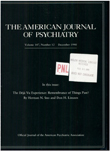The psychiatrist as legal guardian
Abstract
Most discussions about legal guardianship pertain to special populations, such as the mentally retarded or demented. Except for the case of refusal of antipsychotic medication, little has been written about using guardianship to authorize nonemergency treatment for a person who is mentally ill and treatable. The authors present several cases in which a consulting or administrative psychiatrist served as a temporary guardian for a hospitalized patient's personal affairs. The psychiatrist-guardian authorized diagnostic procedures or ECT for the temporarily incompetent patient and was then discharged as guardian. The authors discuss the problems and limitations of such a role for the psychiatrist.
Access content
To read the fulltext, please use one of the options below to sign in or purchase access.- Personal login
- Institutional Login
- Sign in via OpenAthens
- Register for access
-
Please login/register if you wish to pair your device and check access availability.
Not a subscriber?
PsychiatryOnline subscription options offer access to the DSM-5 library, books, journals, CME, and patient resources. This all-in-one virtual library provides psychiatrists and mental health professionals with key resources for diagnosis, treatment, research, and professional development.
Need more help? PsychiatryOnline Customer Service may be reached by emailing [email protected] or by calling 800-368-5777 (in the U.S.) or 703-907-7322 (outside the U.S.).



